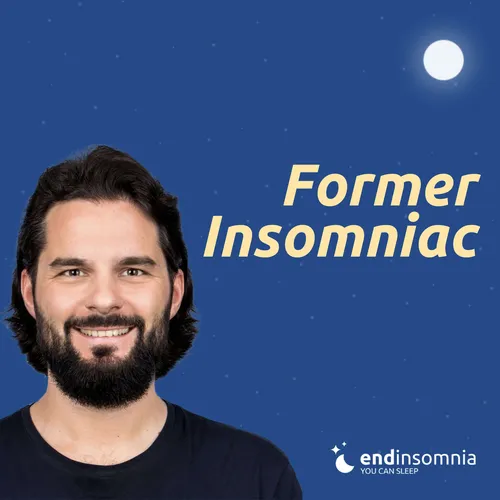
Former Insomniac by End Insomnia
Welcome to Former Insomniac with Ivo H.K., founder at End Insomnia. After suffering from insomnia for 5 brutal years and trying "everything" to fix it, I developed a new approach targeting the root cause of insomnia: sleep anxiety (or the fear of sleeplessness).
In this podcast, I talk about the End Insomnia System and I share tips, learnings, and insights from overcoming insomnia and tell the stories of people who did so you can apply the principles to end insomnia for good, too.
- Update frequency
- every 7 days
- Average duration
- 5 minutes
- Episodes
- 101
- Years Active
- 2023 - 2025

What To Do If You Toss and Turn All Night
Sometimes, you might lie awake at night when you’d much rather be sleeping.
It can feel frustrating, but there are things you can do to make the situation better.
The goal isn’t to force yourself to sl…

How to Manage Anxious Thoughts Around Sleep
Anxious thoughts often make it hard to sleep.
Many people feel more worried as bedtime approaches or wake up in the middle of the night with racing thoughts.
Sometimes, one small thought can snowball i…

Working With Painful Emotions During Insomnia (Exercise Inside)
Painful emotions are one of the most challenging things to accept while we are struggling with insomnia.
Here is an exercise to bring greater mindful acceptance to painful emotions such as anxiety, sa…

Want to Beat Insomnia? Drop the Rope
Sometimes, when we feel bad after a rough night, we make it even worse without realizing it.
One way to think about this is with the idea of clean pain and dirty pain.
• Clean pain is the normal, unavo…

Caring Less How You Sleep at Night
One of the secrets to sleeping well again is learning to care less about how you sleep at night.
While this might sound odd, it works because a calm, less stressed mind helps your body feel more relax…

How to Wind Down Before Bed
Getting ready for bed is an important part of getting your normal sleep back.
Wind down and relax about 45–60 minutes before your sleep window (the time you set aside for sleep).
This helps your body a…

How to Fall Asleep Quick and Easy
One of the best ways to start falling asleep quickly and easily again is by boosting your body’s natural ability to help you fall asleep.
This involves two key parts: your sleep drive and your circadi…

Will Insomnia Do Something Bad to Me? How Long Until I Recover?
You don’t develop insomnia after just one sleepless night.
Insomnia builds up over time because of things like stress, anxiety, and bad sleeping habits.
When you’re anxious about not sleeping, it’s har…

The “Gold Standard” for Insomnia
You’ve probably tried or thought about trying Cognitive Behavioral Therapy for Insomnia (CBT-i).
CBT-i is often considered the “best” way to treat insomnia, the “Gold Standard,” and research shows it …

To Sleep Normally Again, Stop Doing These Things
Let’s talk about why some things you’ve tried to help you sleep, like sleeping pills, bedtime routines, and calming exercises, haven’t worked.
You might be surprised to learn that trying hard to fall …

The Only Two Forces That Control Your Sleep (Nothing Else Ever Will)
Only two things control sleep.
Inside the End Insomnia System, we call them the sleep-starting force and the sleep-stopping force.
The Force That Helps You Sleep
The sleep-starting force makes you feel …

Reversing the Factors That Maintain Insomnia
Insomnia is a vicious cycle.
Worrying about sleep makes it hard to sleep, and not sleeping makes you worry even more. A Stanford study recently confirmed this.
This worry can lead you to do things that…

Why Won't My Insomnia Just Go Away?
When you struggle with insomnia for a long time, you often develop certain habits, thoughts, and actions that make things worse.
These can be called the “Unhelpfuls,” and they include:
- Unhelpful percep…

What Causes Insomnia to Develop?
Insomnia doesn’t just happen out of nowhere.
It usually develops through a combination of factors that set the stage for sleep troubles.
These include risk factors, a triggering event, and the anxiety …

“I’ve Tried Everything for Insomnia and Nothing Works!”
Almost every time I talk to a client before they join us in the End Insomnia Program and finally fix their insomnia, I hear:
“This sounds too good to be true - nothing has worked for me so far - why w…

The Only Solution I Found for Insomnia
Struggling with insomnia can be an isolating experience, leaving you feeling misunderstood by doctors, therapists, and internet sources.
The frustration of seeking help only to feel unheard is common.
…

How to Manage Setbacks During Your Insomnia Recovery
As you apply the End Insomnia System over time, know that setbacks are an inevitable—and even necessary—part of fully reversing insomnia.
It’s wonderful to start sleeping better more consistently afte…

The Science Behind Ending Insomnia
I want to give you more hope that you can change and bring good sleep back into your life and that the tools in the End Insomnia System will help you do it.
Let’s talk about neuroplasticity.
Neuroplast…

How to Reduce Sleep Anxiety (Through Self-Compassion)
We often don’t treat ourselves the way that we treat others.
In our inner dialogues, we can often be critical, cruel, or even abusive.
Yet, judging or blaming ourselves when we are in emotional pain or…

How to be Resilient After a Bad Night
Dealing with insomnia is tough. I know because I’ve been there for five brutal years.
Imagine waking up feeling tired and spending the day feeling worn out and worried about not sleeping well again.
Wh…